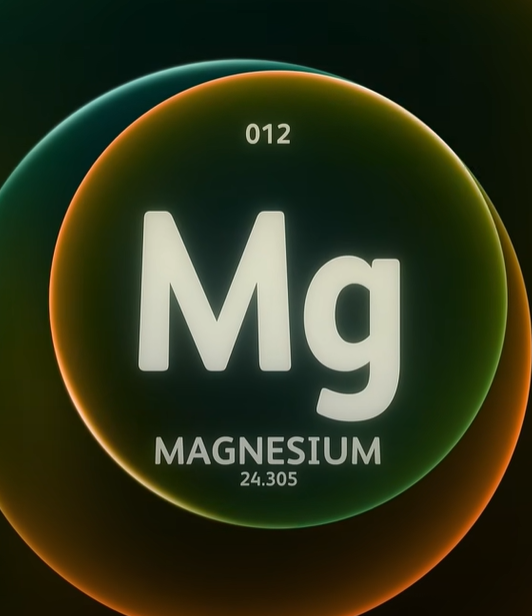Magnesium’s Role in Sleep Regulation
Magnesium is a vital mineral involved in over 300 enzymatic reactions in the body, playing a crucial role in sleep regulation. Often called the ‘relaxation mineral,’ magnesium’s impact on sleep quality and duration is significant.
This comprehensive guide explores the intricate relationship between magnesium and sleep, and provides detailed information on selecting the best magnesium supplement to help you sleep.
Understanding Magnesium’s Sleep-Promoting Mechanisms
The Science Behind Magnesium and Sleep
Magnesium influences sleep through various physiological processes. It’s primary function in sleep regulation involves binding to GABA receptors, which promotes relaxation and reduces neural excitability.
This action helps calm the mind and body, preparing you for sleep.
Additionally, magnesium plays a crucial role in the production and regulation of melatonin, often referred to as the ‘sleep hormone.’ By facilitating the conversion of serotonin to melatonin, magnesium helps maintain a healthy circadian rhythm, which is essential for consistent sleep patterns.
Magnesium Deficiency and Sleep Disorders
Research has established a strong correlation between magnesium deficiency and various sleep disorders, including insomnia and restless leg syndrome. Low magnesium levels can lead to increased sleep latency (the time it takes to fall asleep), reduced sleep efficiency, and more frequent nighttime awakenings.
A study published in the Journal of Research in Medical Sciences found that magnesium supplementation improved subjective measures of insomnia, including sleep efficiency, sleep time, and early morning awakening. Another study in the Journal of Clinical Sleep Medicine showed that magnesium supplementation reduced the severity of restless leg syndrome symptoms, which often interfere with sleep.
Choosing the Right Magnesium Supplement
Bioavailability and Absorption
When selecting a magnesium supplement for sleep, bioavailability is a key factor to consider. Different forms of magnesium have varying absorption rates in the body, which directly impacts their effectiveness.
Magnesium Glycinate
Magnesium glycinate is often considered the gold standard for sleep support. This form combines magnesium with the amino acid glycine.
It offers high bioavailability and is less likely to cause gastrointestinal side effects compared to other forms.
Glycine itself has calming properties, making this form particularly useful for sleep.
A study in the Journal of Neuropharmacology found that glycine improved subjective sleep quality and reduced daytime sleepiness in participants with insomnia. When combined with magnesium, these effects may be enhanced.
Magnesium Threonate
Magnesium threonate is a newer form of magnesium that has gained attention for it’s ability to cross the blood-brain barrier more effectively than other forms. While research is ongoing, preliminary studies suggest it may have cognitive benefits in addition to sleep-promoting effects.
A study published in Neuron found that magnesium threonate improved learning and memory in rats. While more human studies are needed, this form shows promise for both cognitive function and sleep quality.
Magnesium Citrate
Magnesium citrate is a popular and affordable option with good bioavailability. However, it may have a mild laxative effect, which can be useful for some but problematic for others.
If you’re prone to digestive issues, you might want to start with a small dose or consider a different form.
Magnesium Taurate
This form combines magnesium with taurine, an amino acid that supports GABA production. While less common, it may offer additional benefits for sleep and cardiovascular health.
A study in the Journal of Cardiology found that magnesium taurate improved heart rate variability, which is associated with better sleep quality.
Dosage and Timing
The optimal dosage of magnesium for sleep improvement can vary based on factors such as age, sex, and individual health conditions. Generally, doses between 200-400 mg taken before bedtime are commonly recommended. However, it’s crucial to start with a lower dose and gradually increase to assess your tolerance and response.
Timing is also essential. Taking magnesium supplements about 1-2 hours before bedtime can help promote relaxation and prepare the body for sleep.
Some people find that splitting the dose, taking half in the morning and half in the evening, works best for them.
Be aware that the recommended dietary allowance (RDA) for magnesium varies by age and sex:
- Adult men: 400-420 mg per day
- Adult women: 310-320 mg per day
- Pregnant women: 350-360 mg per day
When considering taking magnesium supplementation for sleep, take into account your dietary magnesium intake to avoid excessive consumption.
Implementing Magnesium Supplementation for Better Sleep
Step-by-Step Guide
- Assess Your Current Magnesium Intake: Before starting supplementation, evaluate your dietary magnesium intake.
Foods rich in magnesium include leafy greens, nuts, seeds, and whole grains.
A food diary can help you estimate your current intake.
- Choose Your Supplement Form: Based on the information provided earlier, choose the magnesium form that best suits your needs. Consider factors like bioavailability, potential side effects, and any specific health concerns you may have.
- Start with a Low Dose: Begin with a lower dose, such as 100-200 mg, to assess your body’s response and tolerance.
This approach allows you to gauge any potential side effects and adjust accordingly.
- Establish a Consistent Routine: Take your magnesium supplement at the same time each day, preferably 1-2 hours before bedtime.
Consistency helps establish a routine and may enhance the supplement’s effectiveness.
- Monitor Your Sleep Quality: Keep a sleep journal to track changes in your sleep patterns, including how long it takes you to fall asleep, sleep duration, and how refreshed you feel upon waking.
This information can help you assess the supplement’s effectiveness.
- Adjust as Needed: If you don’t notice improvements after a few weeks, gradually increase the dose (within recommended limits) or consider trying a different form of magnesium.
Remember to talk to a healthcare provider before making significant changes.
- Combine with Sleep Hygiene Practices: Enhance the effects of magnesium supplementation by implementing good sleep hygiene practices.
This includes maintaining a consistent sleep schedule, creating a relaxing bedtime routine, and optimizing your sleep environment.
Potential Challenges and How to Overcome Them
Gastrointestinal Side Effects
Some forms of magnesium, particularly magnesium oxide and citrate, can cause digestive issues like diarrhea or stomach cramps. If you experience these side effects, try switching to a more easily absorbed form like magnesium glycinate or reducing your dose.
Taking the supplement with food can also help mitigate digestive discomfort.
Interactions with Medications
Magnesium can interact with certain medications, including antibiotics and diuretics. Always inform your healthcare provider about any supplements you’re taking to avoid potential interactions.
In some cases, you may need to adjust the timing of your magnesium intake to minimize interactions.
Oversleeping or Grogginess
While rare, some people may experience excessive sleepiness or grogginess when taking magnesium supplements for sleep. If this occurs, try adjusting the timing of your dose or reducing the amount.
Taking the supplement earlier in the evening or splitting the dose throughout the day may help.
Adapting Magnesium Supplementation to Different Scenarios
Magnesium supplements can help with more than enhancing your sleep:
Shift Work and Jet Lag
For those dealing with irregular sleep schedules due to shift work or travel, magnesium can be particularly beneficial. Consider taking your supplement at a consistent time relative to your sleep period, regardless of the actual time of day.
This can help regulate your body’s internal clock and improve sleep quality.
For jet lag, start taking magnesium a few days before travel and continue throughout your trip. This can help your body adjust to the new time zone more quickly.
Pregnancy and Postpartum
Pregnant and postpartum women often experience sleep disturbances. Magnesium supplementation can be safe and effective during these periods, but always talk to a healthcare provider for appropriate dosing.
Magnesium may also help reduce leg cramps, a common complaint during pregnancy.
During pregnancy, magnesium needs increase. The RDA for pregnant women is 350-360 mg per day.
However, individual needs may vary, so professional guidance is crucial.
Athletic Recovery
Athletes may benefit from magnesium supplementation for sleep and muscle recovery. Magnesium plays a role in muscle relaxation and energy production, making it valuable for athletic performance and recovery.
Consider combining magnesium with other recovery-promoting nutrients like tart cherry juice or L-theanine. Tart cherry juice contains natural melatonin and anti-inflammatory compounds, while L-theanine promotes relaxation without sedation.
A study in the Journal of the International Society of Sports Nutrition found that magnesium supplementation improved sleep quality in elite athletes. The researchers noted improvements in sleep onset latency and sleep efficiency.
Advanced Techniques for Magnesium Optimization
Transdermal Magnesium Application
In addition to oral supplements, transdermal magnesium applications like magnesium oil sprays or Epsom salt baths can provide a choice method of increasing magnesium levels. Some people find this approach particularly relaxing before bedtime.
Transdermal magnesium may be especially beneficial for those who experience gastrointestinal side effects from oral supplements. While research on the effectiveness of transdermal magnesium is limited, many users report improved sleep and reduced muscle tension.
To try this method:
- Apply magnesium oil to your skin, focusing on areas like the feet, legs, and arms.
- Take an Epsom salt bath before bed, using 1-2 cups of Epsom salts in warm water.
- Soak for 20-30 minutes to allow for optimal absorption.
Magnesium Stacking
Advanced users might consider ‘stacking’ magnesium with other sleep-promoting supplements. This approach can potentially enhance the overall sleep-promoting effects, but should be done cautiously and preferably under professional guidance.
Some potential stacking options include:
- Magnesium + Melatonin: Melatonin can help regulate sleep-wake cycles, while magnesium promotes relaxation.
- Magnesium + L-theanine: L-theanine promotes relaxation without sedation, complementing magnesium’s effects.
- Magnesium + GABA: GABA is an inhibitory neurotransmitter that can enhance magnesium’s calming effects.
When stacking supplements, start with low doses of each and gradually increase as needed. Monitor your response closely and stop if you experience any adverse effects.
Chronotherapy
Aligning magnesium supplementation with your natural circadian rhythm can optimize its effects. Some research suggests that magnesium levels in the body naturally fluctuate throughout the day, with levels typically being lower at night.
Timing your supplementation to coincide with these natural fluctuations may enhance it’s sleep-promoting benefits. Consider taking your magnesium supplement in the evening, about 1-2 hours before your usual bedtime.
Additionally, exposure to natural light during the day and limiting blue light exposure in the evening can help regulate your circadian rhythm, potentially enhancing the effects of magnesium supplementation.
Exercises to Enhance Magnesium’s Sleep-Promoting Effects
Progressive Muscle Relaxation
Progressive muscle relaxation (PMR) is a technique that involves tensing and relaxing different muscle groups while focusing on your breath. This practice can enhance magnesium’s muscle-relaxing properties and promote overall relaxation.
To practice PMR:
- Lie down in a comfortable position.
- Starting with your toes, tense the muscles for 5-10 seconds.
- Release the tension and focus on the feeling of relaxation for 10-20 seconds.
- Move up through your body, tensing and relaxing each muscle group.
- End with the muscles in your face and scalp.
Combining PMR with magnesium supplementation for sleep may enhance both the physical and mental relaxation needed for quality sleep.
Mindfulness Meditation
Incorporating a short mindfulness practice before bed can calm the mind and prepare for sleep, complementing magnesium’s relaxation effects. Mindfulness meditation has been shown to reduce insomnia symptoms and improve sleep quality.
A simple mindfulness practice:
- Sit or lie in a comfortable position.
- Close your eyes and focus on your breath.
- Notice the sensation of air moving in and out of your body.
- When your mind wanders, gently bring your attention back to your breath.
- Start with 5 minutes and gradually increase the duration.
Regular mindfulness practice, combined with magnesium supplementation, may create a powerful synergy for improving sleep quality.
Magnesium-Rich Meal Planning
Creating a weekly meal plan that incorporates magnesium-rich foods can support your supplementation routine and overall magnesium intake. Some magnesium-rich foods to include:
- Leafy greens (spinach, Swiss chard, kale)
- Nuts and seeds (almonds, pumpkin seeds, sunflower seeds)
- Whole grains (quinoa, brown rice, oats)
- Legumes (black beans, lentils, chickpeas)
- Dark chocolate (70% cocoa or higher)
By incorporating these foods into your diet, you can boost your overall magnesium intake and potentially reduce your reliance on supplements.
Sleep Environment Optimization
Assessing and improving your sleep environment can amplify the benefits of magnesium supplementation. Consider the following factors:
- Temperature: Keep your bedroom cool, ideally between 60-67°F (15-19°C).
- Light: Use blackout curtains or an eye mask to block out light.
- Noise: Use a white noise machine or earplugs to minimize disruptive sounds.
- Comfort: Invest in a supportive mattress and comfortable bedding.
- Electronics: Remove or turn off electronic devices that emit blue light.
By creating an optimal sleep environment, you can maximize the relaxation-promoting effects of magnesium and improve your overall sleep quality.
Key Takeaways
- Magnesium plays a crucial role in sleep regulation, affecting GABA receptors and melatonin production.
- Different forms of magnesium have varying bioavailability and effects on sleep.
- Magnesium glycinate and threonate are often considered top choices for sleep support.
- Start with a lower dose (200-400 mg) and adjust based on your body’s response.
- Timing is crucial – take magnesium 1-2 hours before bedtime for optimal effects.
- Combine magnesium supplementation with good sleep hygiene practices for best results.
- Consider advanced techniques like transdermal application or supplement stacking for enhanced effects.
- Incorporate relaxation exercises and mindfulness practices to complement magnesium’s sleep-promoting properties.
- Optimize your sleep environment to maximize the benefits of magnesium supplementation.
- Consult with a healthcare provider before starting any new supplement regimen, especially if you have existing health conditions or take medications.
People Also Asked
What is the best form of magnesium for sleep?
Magnesium glycinate is often considered the best form for sleep due to its high bioavailability and calming effects.
How much magnesium should I take for better sleep?
A typical dose ranges from 200-400 mg, taken 1-2 hours before bedtime. Start with a lower dose and increase gradually if needed.
Can magnesium help with insomnia?
Yes, magnesium supplementation has been shown to improve various aspects of sleep, including reducing the time it takes to fall asleep and increasing sleep duration.
Is it safe to take magnesium every night?
For most people, taking magnesium nightly is safe. However, talk to a healthcare provider to determine the right dosage for your individual needs.
How long does it take for magnesium to improve sleep?
Some people notice improvements within a few days, while others may take a few weeks to see significant changes in sleep quality.
Can magnesium cause vivid dreams?
While not common, some people report experiencing more vivid dreams when taking magnesium. This effect is generally harmless and may be due to improved sleep quality.
Does magnesium interact with sleep medications?
Magnesium can interact with certain medications, including some sleep aids. Always talk to a healthcare provider before combining magnesium with other sleep medications.
Is magnesium better than melatonin for sleep?
Both magnesium and melatonin can be effective for sleep, but they work differently. Magnesium promotes relaxation, while melatonin regulates sleep-wake cycles.
Some people find a combination of both to be most effective.
Can I take magnesium with other sleep supplements?
Magnesium can be safely combined with many other sleep supplements, but it’s best to talk to a healthcare provider before starting any new supplement regimen.
Does magnesium help with restless leg syndrome?
Yes, magnesium supplementation has been shown to reduce the severity of restless leg syndrome symptoms, which can improve sleep quality.


